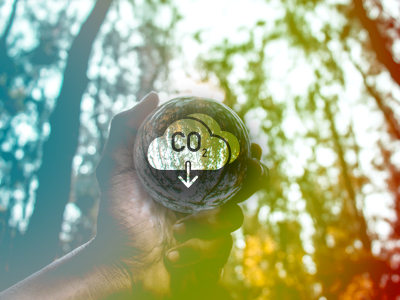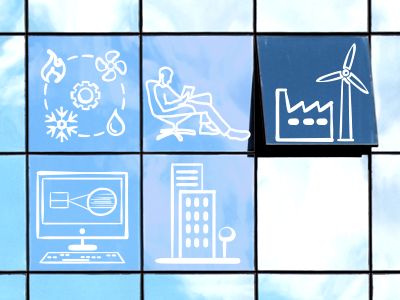Overview
Gain a comprehensive overview of all the technologies that can deliver sustainable heating and cooling systems. Learn to identify technically feasible and cost-efficient solutions in your own heating and cooling decarbonizing projects.
Heat is the largest end-user of energy in the world. Therefore, decarbonization of heating and cooling supply in the built environment and related industries is of crucial importance to meet the targets for reduction of greenhouse gas emissions. In this MOOC you will learn the core concepts and use tools to help you identify sustainable heating and cooling solutions for various types of user demand profiles. We will start by looking at what determines the heating demand of buildings and processes, and how this be reduced. Next, we will take a look at what sustainable sources of heat are available and how to match them to requirements of demand such as space, time, and/or quality (i.e., temperature level). Finally, we will discuss technologies for heat storage, distribution and conversion. Additionally, experts from industry will showcase examples of successful sustainable heating and cooling systems.
After taking this MOOC you will have a clear overview of all the relevant technologies needed in the heat transition and understand which are best suited to which conditions including your own case. This MOOC is suitable for technical professionals who want to contribute to the adoption and successful operation of sustainable heating and cooling systems, but also for policymakers who need to identify solutions and policies to enable the adoption of renewable resources for heating and cooling.
What You'll Learn
After following this MOOC, you will be able to:
- Define the developments of heating/cooling demand/passive heating/cooling
- Demonstrate concepts of conduction, convection, exergy, solar radiation
- Apply and quantify various sources of sustainable heat
- Identify technologies for conversion and storage of heat
- Apply and quantify constraints and driving mechanisms in heat supply systems.
- Apply and quantify economics of heating systems.
- Identify (societal, technical and economical) feasible solutions by combining sources, conversion, storage and transport technologies into an integrated heating/cooling system
Details
Course Syllabus
Week 1: Introduction
During the first week we will set the scene for the MOOC. We discuss why heat is important in the energy transition with clear numbers on use and emissions. Furthermore, we discuss why it is challenging to decarbonize the heat system.
Topics we’ll cover this week:
- heating and cooling demand profiles
- exergy, insulation and temperature levels
- current heating/cooling systems and why it is challenging to change them
Week 2: Sustainable sources of heat
In this week you will be introduced to the various sustainable sources of heat and cooling that exist. You will learn how to quantify their available heating/cooling power, as well as total capacity per year/season.
Topics we’ll cover this week:
- solar collectors
- environmental: surface water, asphalt/road, outside air
- deep and shallow geothermal
- waste heat from industry, datacenters etc.
Week 3: Conversion and storage
A key challenge to meet heating and cooling demand from sustainable sources is the mismatch in quality of the heat and the time when it is available. To overcome these discrepancies various methods exist to store and/or convert heat. Topics we’ll cover in this week:
- fundamental working principles of a heat pump and application/types
- sensible heat storage in underground tanks and pits
- latent and thermo-chemical heat storage.
Week 4: Heat supply systems
In week 2 and 3 we covered the technologies needed to be able to meet heating and cooling demand from sustainable sources. In this week we will discuss how these different technologies can be combined to create heat supply systems. Topics we’ll cover this week:
- temperature levels and supply capacity in buildings and district heating networks
- passive and active heating/cooling
- design of district heating networks
- hydraulic connections and heat exchangers
Week 5: Heat economics and adoption
A key challenge in decarbonizing heating and cooling systems is related to economics (consumers don’t like to pay much for it) and adoption (consumers don’t like to change the systems in their house). During this week we examine these challenges in detail. You will learn how to create a viable business case for your sustainable heating system and how societal and policy aspects may affect its’ feasibility. Topics we’ll cover this week:
- heat economics: Levelized cost over heat (LCOH)
- business case for heat systems
- effective policies for the heat transition
- societal aspects in the heat transition
Week 6: Examples and your first own design
During the last week you will work on your own sustainable heating and cooling system by applying and combining the concepts acquired during the previous weeks. We provide you with inspiration by presenting a wide range of example projects from industry professionals to showcase how various challenges are dealt with in real life projects. We complete the MOOC with a wrap-up. Topics we’ll cover this week:
- individual heating systems
- collective heating systems
- integration of heating system in the future power grid
Other Instructors
- Dr. Phil Vardon - team lead of researchers and educators on the topic of geothermal energy at Delft University of Technology
- Prof.dr. Thijs J.H. Vlugt - full professor and chair of Engineering Thermodynamics at Delft University of Technology
- Dr. Rudi Santbergen - assistant professor of photovoltaic multiscale modeling at the PVMD group at Delft University of Technology
- Dr. Gerdien de Vries - associate professor in Climate Psychology at the Technology, Policy, and Management faculty at Delft University of Technology
- Dr. Aad Correlje - academic researcher and teacher, and consultant and advisor on many energy, water and transport related issues
- Ilham Naharudinsyah, M.Eng. - PhD researcher at the Department of Process and Energy, Delft University of Technology
- Rogier Duijff - consultant at consultancy firm DWA, specializing in district heating systems
- Els van der Roest - external PhD student at Delft University of Technology, as well as at KWR Water Research in the Energy & Circular Systems team
- Rik Molenaar - all-round energy consultant at Techniplan
Qualifications
Chartered Engineering Competences
All our online courses and programs have been matched to the competences determined by KIVI’s Competence Structure, a common frame of reference for everyone, across all disciplines, levels and roles.
These competences apply to this course:
- A1: Extend your theoretical knowledge of new and advancing technologies.
Admission
This is a Massive Open Online Course (MOOC) that runs on edX.
Prerequisites
No other prerequisites are needed than secondary/high school math and physics.


